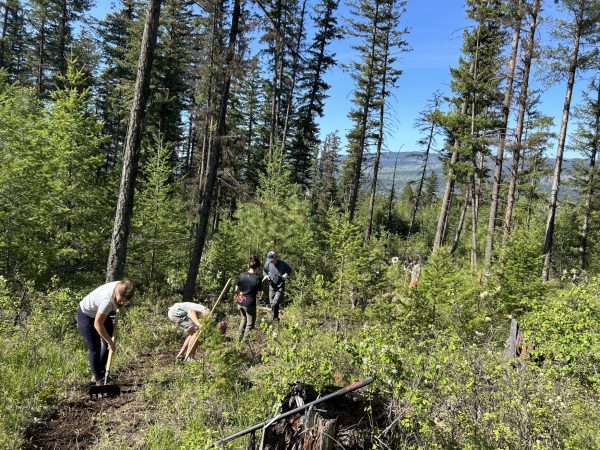From building trails to building relationships, support from Sun Peaks Resort is forging connections with Thompson Rivers University (TRU) students.
Last year, Sun Peaks Resort pledged $75,000 to benefit students. Some of those funds were allocated to the TRU Trails to Reconciliation Fund, a field course where students travel to Interior Indigenous communities to build relationships and assist with mountain bike trail maintenance.

Field school participants cleaning up trails.
“The relationship with Sun Peaks Resort is offering real benefits to faculty and students in Adventure, Culinary Arts and Tourism,” says Doug Booth, dean of Faculty of Adventure, Culinary Arts and Tourism (FACT). “As a sponsor of Adventure’s Trails to Reconciliation program, they’re assisting students to connect with local communities.”
The field school in May took the group to three communities, where they partnered with trail builder First Journey Trails to do spring trail maintenance in areas established by the company. The Trails to Reconciliation field school was developed as a way for students to assist with trail-building efforts in Indigenous communities, but it is also intended to teach students about traditional land use and help them understand the results of community-based tourism development. According to course instructor Bridget Orsetti, it did that and much more.
Three communities, three experiences
The first stop on the tour was in Xatśūll, north of Williams Lake, where students cleaned up mountain biking trails in anticipation of a busy riding season.
From there, they headed to the Big Bar Guest Ranch, recently purchased by the Stswecem’c Xget’tem First Nation (SXFN), which offers visitors a traditional Indigenous experience interwoven with the daily life of a wrangler. The ranch was privately owned for many years and is being revitalized by SXFN to share their Secewépemc culture, language and traditions.
“It was really good for the students to see that developing Indigenous tourism destinations is a journey and for them to see how, as new tourism professionals, they can truly be allies in this journey,” says Orsetti, adding that following the course, one student was hired at Big Bar.
“These communities are open to hiring young people with open minds. That was pretty inspiring for them, I think.”
The last stop on the tour was Chu Chua, north of Barriere. There, the group met up with Tom Eustache, a member of Simpcw First Nation and director/trail builder/lead shredder with the Indigenous Youth Mountain Bike Program. He spent three days with the students, riding with them, sharing knowledge and seeding valuable connections with community members.
“The students really wanted to give back in some way, so with Tom’s help, we organized a community lunch one of the days we were there,” says Orsetti. “The community barbecue day ended up being magic. Tom’s niece is a language champion and the co-ordinator of language in the school. She took the time and gave a tour of the school, while the kids were doing a drumming lesson. She sat with us and shared the journey of the community and the success of this community school. The students loved that. It was a positive story.”
Experiences are enduring
The experiences over the duration of the field course were life-changing for everyone involved and helped each student define what reconciliation means to them.
“As someone who has always been passionate about outdoor adventures and surrounding cultures, this course is an excellent opportunity to learn about traditional land use and the complex issues surrounding reconciliation, especially as an adventure guide operating on unceded territories,” says course participant Thomas Blenkhorn in a short video created by the students.
After completing the course, Blenkhorn decided he wanted more than to just be informed about what reconciliation means. He wanted to be an ally willing to take action. He started thinking about the benefits of hosting a rafting camp for Indigenous youth. With the support of his employer and grant funding from TRU, 13 enthusiastic Indigenous youth spent three days during summer exploring, rafting, learning traditional fishing practices and strengthening their cultural bonds. Blenkhorn is hopeful he’ll have more opportunities to be part of similar camps, working as an ally to preserve Indigenous values and traditions.
Funds create opportunities
The positive ramifications of the field school will continue throughout the participants’ careers. Next year, a new group of students will have the opportunity to forge connections and create paths to reconciliation.
“Having this funding means we can do important things we might not otherwise have been able to do,” says Orsetti. “It’s really important to me that as much of this money goes into these communities as possible. That was huge and this year 90 per cent of it did.”
In addition to Trails to Reconciliation, funding from Sun Peaks Resort supports student familiarization tours, wherein students see the inner workings of a large mountain resort. The funds also assist TRU’s Tourism Innovation Lab Fund so students can develop tourism business ideas through research and industry mentorship.
Sun Peaks Resort also funds awards for TRU undergraduate students in tourism, events and conventions management, culinary arts, trades and technology and early childhood education programs. As part of these awards, students receive mentorship and potential work-placement opportunities at various Sun Peaks Resort operated businesses.

